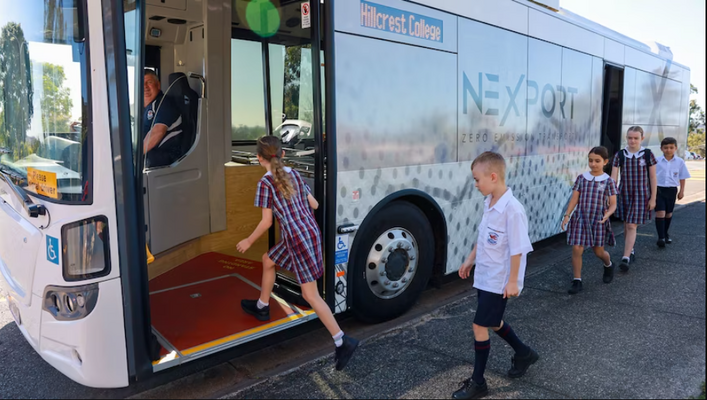Hillcrest Christian College Leads The Way With Electric Bus Trial

*Photo source: Hillcrest Christian College
Hillcrest Christian College Leads the Way with Electric Bus Trial
Hillcrest Christian College on the Gold Coast is making history by trialling electric school buses, the first of its kind in Australia. This move is a part of a broader effort to reduce carbon emissions and promote sustainable transportation options. In this blog, we'll take a closer look at the Hillcrest Christian College electric bus trial, its benefits, and its implications for the future of school transport.
Benefits of Electric Buses
Electric buses are gaining popularity in many countries, including Australia, due to their environmental and economic benefits. The buses emit zero tailpipe emissions, which can significantly reduce the carbon footprint of school transport. As a result, they are better for the environment and for human health, particularly for those with respiratory conditions such as asthma. Electric buses are also quieter and smoother to drive, providing a more comfortable experience for passengers.
In terms of economic benefits, electric buses have lower operating and maintenance costs than their diesel counterparts. According to a report by The Driven, running an electric bus costs around 70% less than running a diesel bus. This is because electric buses require less maintenance, and the cost of electricity is lower than the cost of diesel fuel. Although electric buses require a significant initial investment, the cost savings over the long term make them a more economical choice for schools.
Hillcrest Christian College Electric Bus Trial
Hillcrest Christian College has purchased an electric bus from China and is currently trialling it on school routes. The bus has a range of around 150 km on a single charge and can carry up to 57 passengers. The electric bus has a modern design, with bright colours and a logo that represents the college. The bus is equipped with a range of safety features, including a rearview camera, an emergency door, and a fire extinguisher. It also has air conditioning and USB charging ports for passengers' convenience.
The college's electric bus trial has received a lot of attention in the media, with both ABC News and The Driven reporting on it. According to ABC News, the trial is part of a broader effort by the college to reduce its carbon footprint and promote sustainable transportation options. The electric bus is one of several initiatives that the college has undertaken, including the installation of solar panels and energy-efficient lighting. The college hopes that the trial will encourage other schools to consider electric buses as a viable alternative to diesel buses.
The Future of School Transport
As more schools adopt electric buses, we can expect to see a significant reduction in carbon emissions and improved air quality in local communities. With the Australian government's commitment to reducing greenhouse gas emissions by 26-28% by 2030, electric buses are an important step towards achieving this goal. In addition to environmental benefits, electric buses also offer significant cost savings over their diesel counterparts. As more schools adopt electric buses, we can expect to see a reduction in the cost of running school transport, which can help to alleviate the financial burden on schools and families.
One potential challenge to the widespread adoption of electric buses is the limited availability of charging infrastructure. According to a report by the Electric Vehicle Council, there are currently only around 400 public charging stations in Australia, which is far fewer than the number required to support a fleet of electric buses. However, with the increasing popularity of electric vehicles, we can expect to see more charging infrastructure being built in the coming years.
Hillcrest Christian College's electric bus trial is a positive step towards a more sustainable future for school transport in Australia. With the benefits of zero emissions and significant cost savings, it's likely that more schools will follow suit in the coming years. The college's initiative is part of a broader effort to reduce carbon emissions and promote sustainable transportation options, which is crucial to achieving
